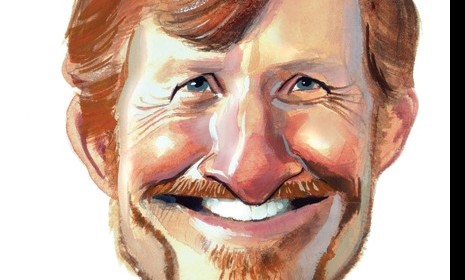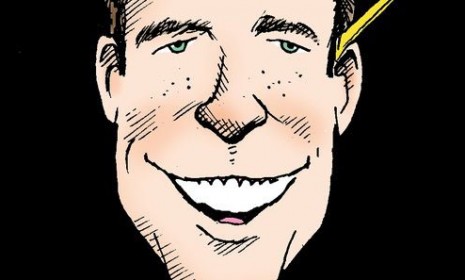Jon Stewart's Moral Majority
A free daily email with the biggest news stories of the day – and the best features from TheWeek.com
You are now subscribed
Your newsletter sign-up was successful
Praising Jon Stewart for virtues other than comedy has become a cliché, as James Fallows noted in his Atlantic blog. At this point it’s hard to dispute that Stewart is not only the functional equivalent of a news anchor, but the most influential anchor in America. Likewise, it’s commonly recognized that jokes are merely a happy byproduct of Stewart’s editorial alchemy. Yet the foundation of the Daily Show, the reason it satisfies so deeply as it entertains, is only partly the thorough research and analytical intelligence it brings to bear on current events. The crucial part of Stewart’s formula is an exacting and sometimes harsh moral judgment.
Stewart is a TV preacher and shame is his drama. He was widely viewed as a harsh political critic of George W. Bush and his administration. More accurately, he was a moral critic of Bush, chastising the White House for hypocrisies more than policies (though Stewart was not amused by torture). His great genius is to wake up each day as a newborn, naïve and trusting, and to convey each night his shock and dismay at how soiled he’s discovered the world to be.
If Stewart’s effort to build a moral majority has a launch date, it is Oct. 15, 2004. That’s when, in the process of promoting his funny book, “America,” he appeared on CNN’s Crossfire with Paul Begala and Tucker Carlson and stubbornly, even obnoxiously, refused to be funny. Stewart’s performance required a steely courage and Obamaesque level of self-belief. But he quickly donned his inquisitor’s robe and commandeered the show, transforming it into an expose of bankrupt talk show conventions. He obliterated a tag team of skilled debaters—on their own show—by avoiding their turf, politics, and sidestepping what they mistakenly thought was his turf, comedy. Instead, he pleaded with the Crossfire hosts to change their sinful ways and “stop, stop, stop, stop hurting America” with their cheesy show. Billy Graham couldn’t have said it with more pathos.
The Week
Escape your echo chamber. Get the facts behind the news, plus analysis from multiple perspectives.

Sign up for The Week's Free Newsletters
From our morning news briefing to a weekly Good News Newsletter, get the best of The Week delivered directly to your inbox.
From our morning news briefing to a weekly Good News Newsletter, get the best of The Week delivered directly to your inbox.
Crossfire, of course, was a tower of babble, premised on serial phoniness. The fraud of the professionally feuding hosts. The fraud of their Washington insider guests trading prepackaged sound and fury. The fraud that the form and content of the program represented something grander, higher, than a swampland minstrel show.
A similar fraud is practiced by CNBC and, in fairness, practiced to a greater or lesser degree by virtually every television talking head at a network other than Comedy Central (where the fraud of TV convention is, after all, the central gag). Stewart’s flaying of Jim Cramer, following his devastating eight-and-a-half minute dismantling of Cramer’s network only days before, was locked down by the Daily Show’s crack research team, which produced video of Cramer recalling his shady maneuvers as a hedge fund manager.
But on the Daily Show, the facts are put in service of Stewart’s moral mission. Stewart never once castigated Cramer for being dumb or naïve or mistaken or unwitting as the financial world imploded. His complaint was that Cramer was immoral. That he knowingly withheld knowledge of Wall Street’s seedy machinations and thereby aided and abetted the crooks. In effect, he accused the entire pom-pom brigade at CNBC of cheering on the thugs as they went about their muggings.
It’s tempting to think of Stewart as a post-modern Murrow or Cronkite, creating an oasis of trust in the half-baked desert of television. But he is less and more than that. At its best, his show has more in common with the dramatic moments of the Watergate or Army-McCarthy hearings than with a newscast. It enlightens less by a stream of information than by a moment of revelation.
A free daily email with the biggest news stories of the day – and the best features from TheWeek.com
To get away with this high-handed act, Stewart employs his “jus’ showbiz” deflector, discounting his very real power and authority and routinely miniaturizing himself (telling Begala and Carlson that his lowly show was preceded by a sock puppet; declaring himself a “snake oil salesman” to Cramer). Unlike the cavalcade of television preachers who came before him, the Bakkers and Swaggarts, Preacher Jon has so far exhibited the strength of character to forego the ego-driven cycle of sin, exposure and disgrace that plagues the televangelist ranks.
If he can continue to expose our hypocrisy without making noticeable contributions of his own, Stewart is poised to become one of the most significant figures in television history. He probably is already. It makes you wonder how, in earlier days and under different circumstances, he might have detoured television’s drive to become the stupid—and stupid-making—medium, a status lamented by everyone from Reinhold Niebuhr and Newton Minnow to Ted Koppel. But in the beginning, there was no Preacher Jon.
Francis Wilkinson is executive editor of The Week.
-
 What to know before filing your own taxes for the first time
What to know before filing your own taxes for the first timethe explainer Tackle this financial milestone with confidence
-
 The biggest box office flops of the 21st century
The biggest box office flops of the 21st centuryin depth Unnecessary remakes and turgid, expensive CGI-fests highlight this list of these most notorious box-office losers
-
 What are the best investments for beginners?
What are the best investments for beginners?The Explainer Stocks and ETFs and bonds, oh my
-
Issue of the week: Who killed the Twinkie?
feature The seemingly imperishable Twinkie has finally met its match, and its name is Big Labor.
-
Issue of the week: Apple’s patent victory over Samsung
feature Apple's “sweeping victory” is among the biggest intellectual-property triumphs on record.
-
Issue of the week: Goldman Sachs’s ‘toxic’ culture
feature Greg Smith’s stinging public resignation from Goldman Sachs landed on Wall Street “like a bomb.”
-
Issue of the week: Can a mortgage deal revive housing?
feature Five big banks reached a settlement with state and federal officials to pay $26 billion to offset some of the damage caused by their misdeeds in the foreclosure crisis.
-
Issue of the week: Europe gets downgraded
feature Standard & Poor's lowered the credit rating for nine European nations, indicating that Europe has not yet convincingly dealt with the debt crisis.
-
 Tom Toles: Cartoonist of the Year
Tom Toles: Cartoonist of the Yearfeature Meet the winner of The Week's Cartoonist of the Year award
-
 Cartoonist of the Year finalists
Cartoonist of the Year finalistsfeature A brief look at this year's nominees
-
Issue of the week: Calling out the crash’s culprits
feature The Senate's Permanent Subcommittee on Investigations has just published its 635-page report on the financial crisis.